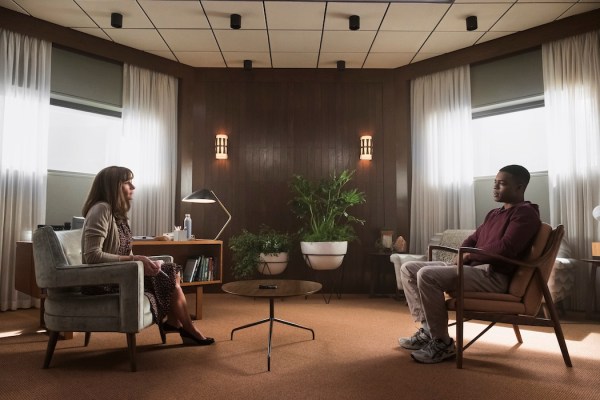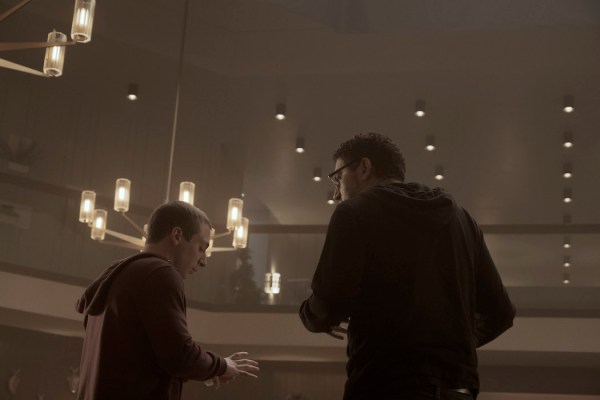Full disclosure – I’m a huge fan of the podcast Homecoming and thankfully the Amazon series didn’t disappoint. Below is my interview with show creators Eli Horowitz and Micah Bloomberg as they discuss taking their program from an audio world to a distinctly visual one (the series has a distinct, Hitchcockian and Brian De Palma-esque flair).

My recording of the interview was mediocre at best, as Bloomberg can clearly be heard but Horowitz’s audio levels were distinctly low. Thus there are a couple of comments from Horowitz that are omitted from the transcript, but in general Bloomberg did most of the talking (with his sound mixing background, that was inevitable!)! The interview’s below, and if you want to subscribe to the Homecoming podcast click here (the series premieres on Amazon Prime on November 2).

What’s the key, from your vantage point, in crafting an intriguing story via podcast form?
Horowitz: It really takes commitment to that form and thinking about that form. Both its possibilities and its limitations. Before we even had a story we were (thinking about) what works? Not even in terms of radio plays or fictional things, but just these voices in our ear and the kind of special intimacy and authenticity (the form) has.
We’re making an audio thing. We’re not writing a script primarily. We’re not making a TV show secretly. We’re just making this audio experience.
Bloomberg: I’m a little biased, but I think when it comes to that form, you need to be thinking in terms of character and personal dynamics. I think a lot of times with a movie or TV show, you can tell a story visually. You can have an object or a process that you need to watch happen. Like if you need to think about a heist or a jail break or something, a lot of the excitement in those type of scenes comes from watching a process takes place and is it going to happen or is it not? There is a part of me that wants to say that is a fundamentally cinematic thing. You’re watching something that’s about to happen or can it happen or can’t it?
I’m sure there’s a way to do that in audio, but that’s not how I write and that’s not the kind of stuff I’m particularly interested in. What I really connected to with our podcast was the personal dynamics between the people and the characters. It’s a thriller story but it’s really driven by those elements, which is people trying to get over on each other or trying to convince each other of stuff. If the story is driven by that, I think it will be interesting to listen to.

The podcast and the series both have their distinct events and character developments. Moving forward, are you keeping both projects, at least in a sense, separate from each other?
Horowitz: We have to accept that they are part of separate canons or separate universes. For a while, that was haunting me and I had to let go of it if I had any hope of letting each one be its own thing. So yeah, they exist on their own.

What were the challenges of collaborating with Sam Esmail and translating your work into series form?
Bloomberg: When we were working on Season One, it was taking something that worked in one form and then figuring out what parts of it would transfer and work well on a TV or a big screen and what parts we needed to shift and change and re-adapt to. There was an editing part of it where we were taking things that we knew were good and we knew we liked, but we had to figure out if they needed to be changed, shortened, or expressed in a different way.
Then it was a question of now that we can see these people, now that we can see where they are – there are other characters that started springing up. (So) how do we incorporate the speed of television, there are shorter scenes, the plot can move a little bit faster, how do we incorporate that language and that type of storytelling but stay true to the patient, sometimes subdued and strange tone that we established with the podcast?
Horowitz: We also tried to take the episodes seriously as episodes which I think kind of help. We gave each episode their own identity, its own start, its own finish rather than blurring it out through the five hours of the series.

What’s the key to a successful collaboration?
Bloomberg: I’m sure each collaboration is different. I like to be inside the scenes with the characters and I almost feel like I’m doing the scene with the characters and I’m not totally aware of the super structure that’s around me. And I feel like Eli has a really good sense of the story as a whole and what’s going on and where we need to be headed.
Horowitz: There’s definitely a different skill, approach and mindset. We’ve created an informal work flow. I think that’s why the show grew out of that. It is about the intimate, naturalistic themes within this broader, thriller structure.
Bloomberg: It’s like these weird scenes of people talking, if they were in any other order than this, then it wouldn’t work. It’s like these strange scenes that are in the correct order where they have the exact information as you move along. The collaboration ended up working really well because our skill sets – they overlap in some cases, but they are very separate. We have our own universes too.
Long answer to your question – find a collaborator who’s good at what you aren’t.

Can you talk about the visual style that Sam Esmail brought to Homecoming?
Bloomberg: He really brought a rigorous sense of film history. I’m a film nerd too. Just watching him take that grammar from the 1970s and 80s with Brian De Palma’s (work) and taking a tennis racket to it and bringing it into the present and doing it in his own distinct way, that’s certainly not what I was thinking. It was so amazing to watch him find the connecting strands between those Brian De Palma movies and our story. It was really cool.

Can both of you name one of your favorite films, and what is it about this particular film that stands out for you?
Horowitz: For some reason, I was just thinking about Children of Men, which I love that it’s a little bit similar to Homecoming. It has a big, high concept premise but it’s definitely a character based (narrative).
Bloomberg: Terms of Endearment is my favorite movie and I think if you can get characters and performers to the point where you think of them as people and you’re watching these scenes unfold. You’re just marveling at these people you know, and even when the movie’s over and you’re in your life and you just think about those moments and interactions between those people as you have interactions with other people in your life. That’s the goal to me, is to create things that stick in your brain with the same vividness as a memory. And I think that film does it better than any other.

When did each of you know that storytelling was going to become a big part of your life?
Horowitz: I think I was always interested in how a different form of (storytelling) can affect how that story can be told. So this process of moving from audio to visual has been very much about that.
Bloomberg: I could not stop watching TV and I could not stop going to the movie theater. I wanted to do that as long as I can remember – that was the only thing I cared about or thought was interesting, really. I think the style that I write in – I would listen to unedited TV all day as a sound mixer, and so I would listen to documentaries and corporate videos and as far as doing a feature film or whatever it was I would listen to people talking all day long for like 14-16 hours a day. And then I would go home on nights and weekends and I would need to dump this speech out somewhere. And so I was always writing but once I started sound mixing it really affected my ability to mimic speech. All those hours of listening to people had a drastic effect on how I render our language.
Forecasters are predicting audio is the next great frontier. How do you feel about its place in the content marketplace?
Horowitz: I do think audio occupies an interesting space because there is something specific about how our brain works, even just you can become engaged in a story just as you are driving or mowing the lawn – that is just a factual feature that audio, television, or books don’t have. So it is an interesting way of getting information while other parts of your brain and body are free. I don’t think that’s going away, so it’s interesting.
Bloomberg: I’m not an expert on any of this stuff but I just find it cuts through clutter in a weird way. Someone’s talking and you’re listening. It’s not multi-phased. You’re not in a 3D room (thinking) where do I even go? You’re not watching a screen with a million other options and you’re being inundated. It’s just like a person is talking. When I get in my car and I listen to an Audible book or something like that, it’s incredibly soothing how straightforward that transaction is.
****Homecoming premieres on Amazon Prime on November 2. Check out my review on the previous post!









